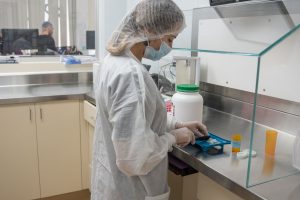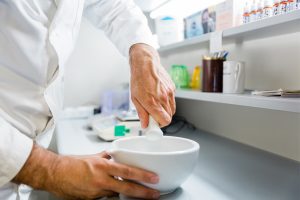Sometimes people need customized medication to meet their unique healthcare requirements. This is where specialty compounding can be a very effective alternative. It can help you meet your personalized needs. At Silver Speciality RX, we offer a variety of compounding solutions. Below are 5 of the main specialty compounding categories:
Pediatric Compounding
Pediatric compounding is the process of preparing customized medications for children. Compounding pharmacists create medications in different forms such as suspensions, syrups, creams, gummies, and more, that are easier for children to take and provide the right dose for their age and weight. This is important because children may have difficulty swallowing pills or tablets.
Learn more about our pediatric compounding
Dermatology Compounding
Dermatology compounding focuses on preparing customized medications for dermatological conditions such as eczema, psoriasis, acne, and other skin conditions. This can involve preparing topical creams, ointments, lotions, or gels that contain medications in different concentrations, or combinations that are not available commercially. Dermatology compounding can also involve the removal of certain ingredients that may be irritating or harmful to the patient’s skin.
Learn more about our dermatology compounding
Podiatry Compounding
Podiatry compounding prepares customized medications for foot and ankle conditions, including fungal infections, plantar fasciitis, neuropathy, and other conditions affecting the lower extremities. This may involve preparing topical creams or ointments that contain medications in different concentrations or combinations that are not available commercially. Podiatry compounding can also involve the removal of certain ingredients that may be harmful or irritating to the patient’s skin.
Learn more about our podiatry compounding
Hormone Therapy Compounding
Hormone therapy compounding focuses on preparing customized hormone replacement medications for individuals, including women and men, who require hormone therapy. Compounding pharmacists work with healthcare to prepare medications in different forms such as creams, gels, troches, capsules, or injections, that contain hormones such as estrogen, progesterone, testosterone, and others. Hormone therapy compounding can also involve the preparation of bioidentical hormones, which are hormones that are structurally identical to those produced by the human body. This can be beneficial for patients who have not responded well to commercially available hormone replacement therapies or have experienced side effects.
Learn more about our hormone therapy compounding
Pain Management Compounding
Compounding pharmacists create medications tailored to meet the specific needs of each patient, considering the type, severity, and location of their pain. They create medications in creams, gels, capsules, troches, injections, or suppositories, that contain different types of pain-relieving medications such as opioids, non-steroidal anti-inflammatory drugs (NSAIDs), muscle relaxants, anesthetics, and others. Pain management compounding can also involve the preparation of medications with specific dosages or combinations that are not commercially available. The goal of pain management compounding is to provide effective and safe pain relief for patients while minimizing side effects and drug interactions. It can be particularly useful for patients who have difficulty swallowing pills or have allergies or sensitivities to certain ingredients in commercially available pain medications.
Learn more about our pain management compounding






